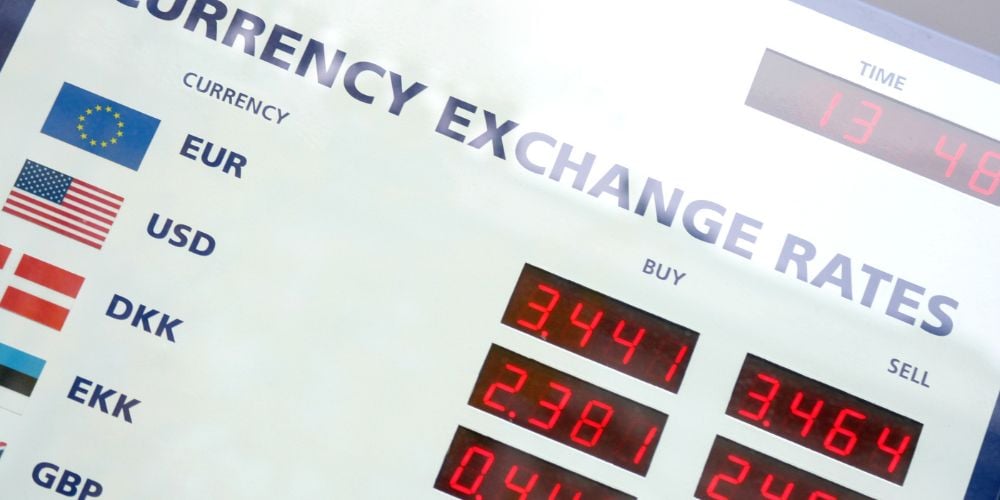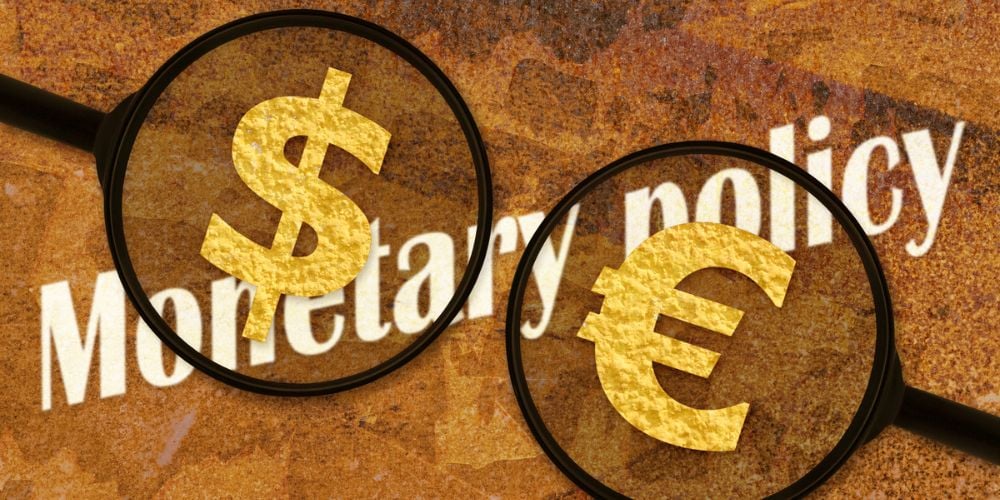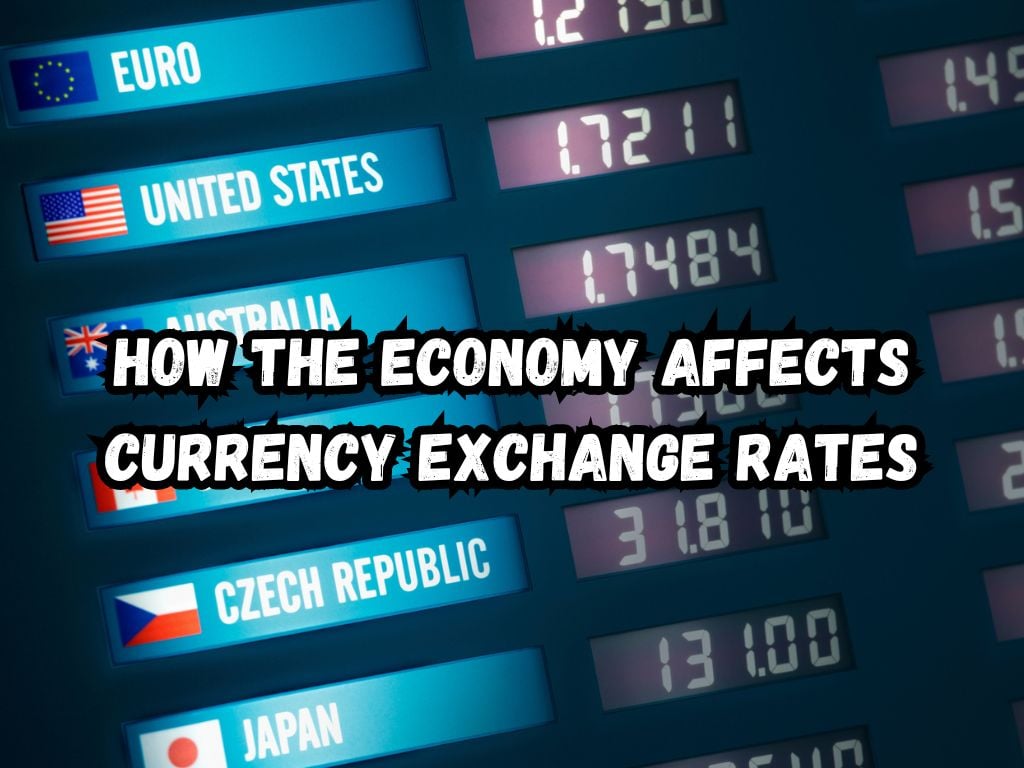Currency exchange rates play a crucial role in global economics, influencing international trade, investment flows, and the overall financial health of nations.
Understanding the relationship between the economy and currency exchange rates is essential for individuals, businesses, and policymakers alike.
In this comprehensive guide, we will delve into the factors that influence exchange rates and explore how the economy impacts them.
How The Economy Affects Currency Exchange Rates?
To comprehend the impact of the economy on exchange rates, it is crucial to consider various factors that influence currency valuations.
Economic Indicators
Economic indicators provide insights into the health and performance of an economy. Several key indicators affect currency exchange rates significantly.
Inflation Rate: Inflation, or the increase in the general price level of goods and services, erodes the purchasing power of a currency. Higher inflation rates often lead to a depreciation of the currency as it becomes less desirable for investors.
Interest Rates: Central bank-set interest rates have a considerable impact on currency exchange rates. Higher interest rates typically attract foreign investors, thereby increasing demand for the currency and raising its value.
GDP Growth: A country’s economic growth is a critical factor affecting currency exchange rates. Strong GDP growth signals a prosperous economy, attracting foreign investors and leading to currency appreciation.
Unemployment Rate: A lower unemployment rate signals a strong economy and can translate into increased consumer spending power, which, in turn, affects currency exchange rates.
Consumer Confidence: Confidence levels in an economy impact consumer spending patterns and can influence currency exchange rates. Higher consumer confidence typically strengthens the currency.

Market Sentiment
Market sentiment, driven by investor behavior and prevailing market conditions, also affects currency exchange rates.
Investor Risk Appetite: In times of global economic stability and confidence, investors are more willing to take risks and invest in riskier assets, including currencies of emerging markets. This increased demand can appreciate the currencies of these nations.
Political Stability: The political stability of a country is crucial for maintaining a strong currency exchange rate. Political uncertainties can lead to volatile currency fluctuations and deter foreign investments.
Market Speculation: Currency markets are highly influenced by market speculators who attempt to profit from short-term price movements. Speculative activities can lead to volatility and impact exchange rates.
Trade Balance and Current Account
The trade balance and current account of a country also play a significant role in determining exchange rates.
Balance of Payments: The balance of payments reflects the economic transactions between a country and the rest of the world. A trade surplus, resulting from higher exports than imports, can strengthen a country’s currency, while a trade deficit can lead to depreciation.
Import and Export Volumes: The volume of goods and services exported and imported by a country impacts its currency exchange rate. Strong export performance generally results in a stronger currency.
Trade Deficits and Surpluses: Persistent trade deficits place downward pressure on a country’s currency. Conversely, trade surpluses can lead to currency appreciation.
How Economy Impacts Currency Exchange Rates
Understanding the impact of the economy on currency exchange rates is essential for individuals and businesses engaged in international trade and investment.
Strong Economy vs. Weak Economy
A robust economy often translates to a strong currency, while a weak economy tends to result in a weaker currency.
Appreciation vs. Depreciation of Currency
A strong economy characterized by positive economic indicators, such as high GDP growth, low unemployment, and stable inflation, leads to a stronger currency.
In contrast, a weak economy with low growth, high unemployment, and excessive inflationary pressures can cause depreciation of the currency.
Impact on Imports and Exports
A strong currency makes imports cheaper and exports more expensive, potentially leading to a decrease in export volumes and an increase in import volumes.
Conversely, a weak currency can make exports more competitive and stimulate economic growth.
Inflationary Pressures
The state of the economy affects inflation rates, which, in turn, impact currency exchange rates. Higher inflation, resulting from a weak economy, can lead to currency depreciation as it erodes purchasing power.

Monetary Policy
The monetary policies implemented by central banks have a significant influence on currency exchange rates.
Interest Rate Decisions
Central banks adjust interest rates to stimulate or restrain an economy. Higher interest rates attract foreign investors seeking better returns, increasing demand for the currency and strengthening its value.
Central Bank Interventions
Central banks actively participate in the foreign exchange market to influence their currency’s value. They may buy or sell large amounts of currency to stabilize exchange rates during volatile times.
Quantitative Easing
In times of economic downturn, central banks may implement quantitative easing measures. This involves injecting money into the economy to stimulate growth or combat deflation.
The increased money supply can put downward pressure on the currency exchange rate.
Fiscal Policy
Government spending and taxation policies impact the overall economy and can indirectly affect exchange rates.
Government Spending and Taxation
Expansionary fiscal policies, such as increased government spending or reduced taxes, can stimulate economic growth.
This growth can strengthen the currency. Conversely, austerity measures may lead to decreased government spending, slower growth, and a weaker currency.
Budget Deficits and Surpluses
Excessive budget deficits erode investor confidence and can lead to a weaker currency. Countries with sound fiscal policies and budget surpluses tend to have stronger currencies.
Case Studies: Historical Examples
Examining historical examples can provide valuable insights into how the economy impacts currency exchange rates.
Global Financial Crisis of 2008
The global financial crisis led to an economic downturn, with central banks implementing expansionary monetary policies and reducing interest rates.
These actions weakened currencies in many countries as governments attempted to stimulate economic growth.
Brexit and the Pound Sterling
The United Kingdom’s decision to leave the European Union (EU) – Brexit – led to political and economic uncertainties.
The pound sterling decreased in value as market sentiment deteriorated due to the potential negative impact of Brexit on the UK economy.
Emerging Market Currency Crises
Currency crises in emerging markets, such as the Asian financial crisis of 1997 and the Argentine financial crisis of 2001, were triggered by economic weaknesses, high inflation rates, and political instabilities.
These crises caused significant depreciation of the affected currencies.
Managing Currency Exchange Rate Risk
Businesses engaged in international trade often face currency exchange rate risks. Implementing appropriate risk management strategies is crucial to mitigate potential negative impacts.
Hedging Strategies: Companies can utilize various hedging instruments, such as forward contracts and options, to protect against currency fluctuations. These instruments can provide stability in cash flows and protect profit margins.
Currency Futures and Options: Currency futures and options contracts enable businesses to lock in exchange rates for future transactions. These instruments help eliminate uncertainty and ensure predictable cash flows.
Currency Swaps: Currency swaps involve exchanging principal and interest payments in one currency for another. They can help companies manage exposure to currency fluctuations for long-term investments or financing.
The Role of Central Banks
Central banks play a vital role in influencing and stabilizing currency exchange rates.
Exchange Rate Regimes: Countries adopt different exchange rate regimes, such as fixed, floating, or managed exchange rates. These regimes determine how central banks intervene and influence exchange rates.
Central Bank Interventions: Central banks actively intervene in the foreign exchange market by buying or selling significant amounts of currency to influence its value. These interventions aim to stabilize exchange rates during periods of volatility.

Impact on International Trade and Business
Currency exchange rates affect various aspects of international trade and business operations.
Exporters and Importers
Exchange rates directly impact the profitability of exporting and importing goods and services. Exchange rate fluctuations can alter profit margins and competitiveness in international markets.
Multinational Corporations
Multinational corporations with operations in multiple countries must navigate the complexities of currency exchange rates. Fluctuations in exchange rates can influence revenues, costs, and financial reporting.
Tourism and Travel Industry
Exchange rate fluctuations affect the cost of travel and tourism. A stronger currency can make traveling abroad more expensive for tourists, potentially impacting tourist-driven economies.
Frequently Asked Questions
How does inflation affect currency exchange rates?
Inflation erodes the purchasing power of a currency, leading to depreciation. Higher inflation rates typically weaken a currency.
What is the impact of interest rates on currency exchange rates?
Higher interest rates attract foreign investors seeking better returns, increasing demand for the currency and strengthening its value.
Can political events impact currency exchange rates?
Political events can significantly impact currency exchange rates, especially when they create uncertainties and affect investor confidence.
What role do speculators play in currency markets?
Speculators engage in short-term trading activities, aiming to profit from currency price movements. Their activities can contribute to currency market volatility.
How do currency exchange rates affect business profitability?
Exchange rate fluctuations can impact the profitability of businesses engaged in international trade, as they affect the costs and revenues associated with foreign currencies.
Conclusion
Understanding the intricate relationship between the economy and currency exchange rates is essential for individuals, businesses, and policymakers.
Economic indicators, market sentiment, trade balances, and government policies all influence currency valuations. The impact of the economy on exchange rates manifests through various channels, such as inflation, interest rates, and monetary and fiscal policies.
By comprehending these dynamics, businesses can better manage currency exchange rate risks, while individuals can make informed decisions regarding international travel and investment.
Staying informed about economic trends and factors shaping exchange rates is crucial for navigating the complex world of global currencies.


 Tags:
Tags:










